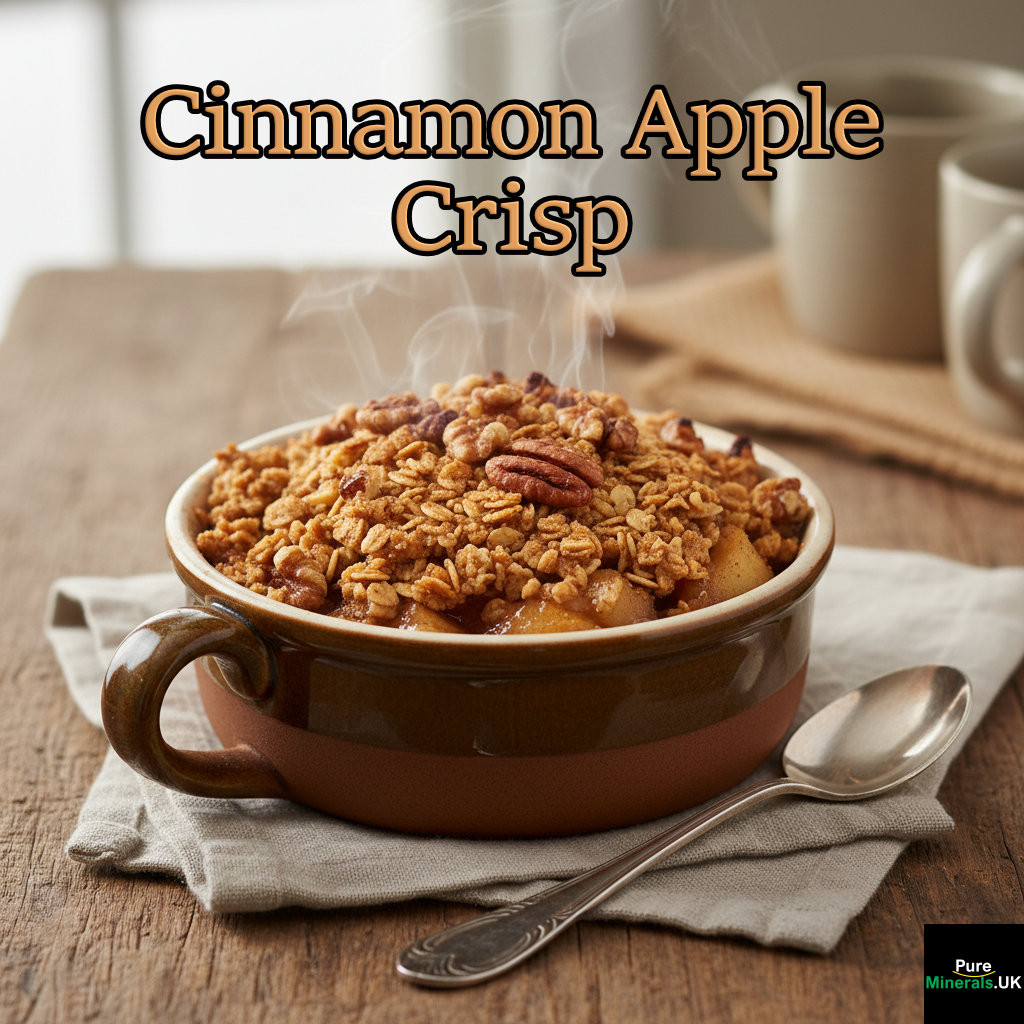Published: 19 November 2025
Last Updated: 15 January 2026
This article is periodically reviewed and updated to reflect current scientific understanding by George Wesler.
Fact-Checked: 1 other authoritative medical/scientific reference. See our Editorial Policy.

Updated 19 November 2025 with further information about cinnamon.
What Is Cinnamon and Why Is It Widely Used for Its Sweet, Warming Aroma and Traditional Metabolic and Digestive Benefits?
Cinnamon is a warming spice made from the inner bark of Cinnamomum trees, prized for its sweet, aromatic flavour. Rich in cinnamaldehyde and other phenolic compounds, it has long been used to support digestion, circulation, and metabolic balance. Cinnamon features prominently in both culinary traditions and herbal practices across the world.
Definition:
Cinnamon is derived from the dried inner bark of several Cinnamomum species, most notably C. verum (Ceylon cinnamon) and C. cassia. The bark contains volatile oils dominated by cinnamaldehyde, along with coumarins and flavonoids that contribute to its characteristic aroma, flavour, and traditional wellness applications in both Eastern and Western herbal systems.
Key Facts:
- Botanical genus: Cinnamomum
- Key species: C. verum (Ceylon), C. cassia, C. burmannii, C. loureiroi
- Parts used: Inner bark (rolled quills or ground)
- Primary compounds: Cinnamaldehyde, eugenol, coumarins
- Flavour profile: Sweet, warm, woody, aromatic
- Primary functions: Metabolic support, digestion, circulation
- Traditional regions: Sri Lanka, India, China, Southeast Asia
Key Takeaways
- Ceylon cinnamon offers superior health benefits with lower coumarin levels compared to the more common Cassia variety, making it the safer choice for regular consumption.
- Cinnamon can help regulate blood sugar levels by improving insulin sensitivity, making it a powerful natural aid for those managing diabetes or prediabetes.
- From sweet treats to savory dishes, cinnamon’s versatility extends far beyond traditional desserts, offering both flavor enhancement and health benefits.
- The active compounds in cinnamon provide anti-inflammatory and antioxidant properties that support heart health and may help reduce chronic disease risk.
- SpicyOrganic provides premium organic Ceylon cinnamon that maximizes both flavor and health benefits in your culinary creations.
Updated on November 1, 2025, with new details on cinnamon’s benefits, flavour, and practical applications.
Cinnamon doesn’t just make your kitchen smell heavenly—it’s one of the most powerful healing spices available in your pantry right now. This aromatic bark has been revered for thousands of years across numerous cultures, not only for its distinctive flavor but for its impressive medicinal properties. Whether you’re looking to manage blood sugar, reduce inflammation, or simply add depth to your cooking, cinnamon delivers on all fronts.
The beauty of cinnamon lies in its dual nature as both medicine and culinary delight. Rather than treating it as just another spice, understanding its properties allows you to transform everyday meals into functional foods that support your health goals while delighting your taste buds.
Spice Up Your Life: Why Cinnamon Belongs in Every Kitchen

Long before modern science confirmed its benefits, cinnamon was treasured across ancient civilizations for both culinary use and medicinal applications. This unassuming spice first gained prominence in Egypt around 2000 BCE and was considered more valuable than gold in medieval Europe. The warm, sweet aroma transforms ordinary dishes into memorable experiences, while its complex flavor profile adds depth to everything from morning oatmeal to sophisticated dinner entrees.
Beyond its culinary appeal, cinnamon contains powerful bioactive compounds that work on multiple levels within the body. Cinnamaldehyde, the main active component, is responsible for most of cinnamon’s powerful effects on metabolism and health. Just a half teaspoon daily can provide measurable benefits for many people, particularly those managing metabolic conditions.
Modern research has validated what traditional medicine practitioners knew intuitively—this spice is truly a functional food at its finest. With antimicrobial, anti-inflammatory, and blood sugar-regulating properties, cinnamon works as both preventive medicine and symptom management for various conditions. The convenience of incorporating it into foods you already enjoy makes it one of the most accessible natural remedies available.
Types of Cinnamon: Choosing the Right Variety

Not all cinnamon is created equal, and understanding the differences between varieties can significantly impact both flavor outcomes and health benefits. While many shoppers simply grab whatever’s labeled “cinnamon” on grocery store shelves, there are actually several distinct types with varying chemical compositions and taste profiles.
Ceylon vs. Cassia: The Critical Differences
Cinnamon sticks are made by stripping the inner bark from cinnamon trees, which then dries and naturally curls into sticks. After the outer bark is removed, the inner bark is peeled off in strips. These strips are then sun-dried, causing them to curl into quills, which are then cut to size.

Ceylon cinnamon (Cinnamomum verum) is often referred to as “true cinnamon” and originates primarily from Sri Lanka. Its light brown color and delicate, sweet flavor make it prized by culinary experts. The thin, papery bark curls into perfect quills during the drying process, creating the classic cinnamon stick appearance. Most importantly for health applications, Ceylon contains very low levels of coumarin, a naturally occurring compound that can be harmful to the liver in large amounts.
Cassia cinnamon, by contrast, is what you’ll typically find in American supermarkets. This variety grows throughout China, Indonesia, and Vietnam, featuring a darker reddish-brown color and thicker bark. Its flavor is more pungent and somewhat harsher than Ceylon, with higher levels of essential oils that create that recognizable “cinnamon” taste most Americans know. However, Cassia contains significantly higher levels of coumarin—sometimes 1000 times more than Ceylon—making it less suitable for regular therapeutic use.
- Ceylon: Light brown, thin, papery layers, subtle sweet flavor, very low coumarin
- Indonesian Cassia: Dark brown, thick bark, strong flavor, high coumarin
- Vietnamese Cassia (Saigon): Highest oil content, most intense flavor, high coumarin
- Chinese Cassia: Most commonly available, moderately strong flavor, high coumarin
- Korintje: Indonesian variety with balanced flavor, moderate coumarin
Which Type Offers More Health Benefits?
When it comes to therapeutic use, Ceylon cinnamon holds a clear advantage. Its significantly lower coumarin content makes it safe for daily consumption even at higher doses. For those using cinnamon specifically for blood sugar management or other health concerns, this distinction becomes crucial. Regular consumption of high-coumarin Cassia varieties could potentially lead to liver damage over time, particularly for sensitive individuals.
Best Cinnamon Forms: Sticks, Ground, or Supplements
Cinnamon comes in several forms, each with distinct advantages for different applications. Cinnamon sticks (or quills) retain their oils and flavor compounds longer than ground cinnamon, making them ideal for simmering in liquids or storing long-term. These intact bark pieces can be used to infuse everything from teas and mulled wines to broths and stews.
Ground cinnamon offers convenience and blending ability that make it perfect for baking and spice mixes. However, its increased surface area means faster degradation of the volatile oils that provide both flavor and health benefits. For optimal potency, purchase small quantities of freshly ground cinnamon rather than storing large containers for extended periods.
For therapeutic purposes, supplements provide standardized doses in capsule form, typically containing concentrated cinnamon extract. These can be useful for those seeking specific health benefits without necessarily adding the spice to food, though whole-food applications generally offer better absorption of beneficial compounds along with the enjoyment of culinary experiences.
5 Impressive Health Benefits of Cinnamon
The health potential of cinnamon extends far beyond its delightful aroma and flavor. This ancient spice contains powerful bioactive compounds that have been extensively researched for their effects on human health. From metabolism to immune function, cinnamon’s influence on bodily systems makes it truly deserving of its “superfood” status.
Blood Sugar Control: How Cinnamon Helps Manage Diabetes
Cinnamon stands out among natural remedies for its remarkable ability to improve insulin sensitivity and lower blood glucose levels. It works by activating insulin receptors, allowing cells to utilize glucose more effectively and reducing insulin resistance. Multiple studies have shown that consuming just 1-6 grams daily can lower fasting blood sugar by 10-29% in people with type 2 diabetes.
The spice also slows the breakdown of carbohydrates in the digestive tract and blocks certain enzymes that interfere with insulin function. This multi-mechanism approach makes it particularly valuable as a complementary approach to conventional diabetes management. Even for those without diabetes, cinnamon can help prevent dangerous blood sugar spikes after high-carbohydrate meals.
Heart Health Protection
Cinnamon offers impressive cardiovascular benefits, particularly for those with risk factors like elevated cholesterol or high blood pressure. Regular consumption has been shown to reduce total cholesterol, LDL (“bad”) cholesterol, and triglycerides while maintaining HDL (“good”) cholesterol levels. These effects are particularly pronounced in people with type 2 diabetes, where heart disease risk is already elevated.
The spice also helps dilate blood vessels and improve circulation through its anti-inflammatory properties, potentially lowering blood pressure and reducing strain on the heart. For those concerned about heart health, incorporating cinnamon into daily meals provides a simple yet effective protective strategy that complements other heart-healthy habits.
Anti-Inflammatory Properties
Chronic inflammation underlies many modern diseases, from arthritis to heart disease and even certain cancers. Cinnamon contains numerous anti-inflammatory compounds that help combat this systemic inflammation at its source. The cinnamaldehyde in cinnamon inhibits certain proteins that trigger inflammatory responses, essentially turning down the body’s inflammatory volume.
For those with inflammatory conditions like rheumatoid arthritis, regular cinnamon consumption may help reduce pain and swelling when used alongside conventional treatments. Even for healthy individuals, cinnamon’s anti-inflammatory effects can help prevent the low-grade inflammation associated with aging and chronic disease development.
Antioxidant Powerhouse
Cinnamon ranks among the most potent antioxidant foods available, outperforming even recognized superfoods like garlic and oregano in laboratory testing. Its diverse array of polyphenols, phenolic acids, and flavonoids neutralize free radicals that damage cells and accelerate aging. This potent antioxidant action helps protect tissues throughout the body from oxidative stress and may slow age-related deterioration.
The antioxidant effects extend to brain health, with research suggesting cinnamon may help protect neural tissue from oxidative damage associated with conditions like Alzheimer’s disease. By incorporating cinnamon into your daily diet, you’re essentially providing your body with a natural shield against the oxidative damage that occurs through normal metabolism and environmental exposures.
Digestive Aid Benefits
Cinnamon has been used for centuries as a natural remedy for digestive complaints, from simple indigestion to more complex issues. It stimulates saliva and gastric juices, enhancing digestion and nutrient absorption while relieving gas and bloating. The spice also contains prebiotic compounds that nourish beneficial gut bacteria, supporting a healthy microbiome essential for proper immune function and overall health. To explore more about other beneficial spices, check out the properties of cardamom.
For those dealing with digestive discomfort, a simple cinnamon tea can provide quick relief from symptoms while addressing some of the underlying imbalances. The spice’s antimicrobial properties may also help eliminate harmful bacteria like H. pylori without disrupting beneficial flora, making it gentler than conventional antibiotics for certain digestive infections. To learn more about the health benefits of cinnamon, explore this detailed guide.
Easy Sweet Cinnamon Recipes
While cinnamon’s health benefits are impressive, its warm, sweet flavor is what truly makes it a kitchen staple. These sweet recipes showcase cinnamon’s versatility while delivering its therapeutic compounds in delicious forms that the whole family will enjoy.
1. Perfect Homemade Cinnamon Rolls

These classic cinnamon rolls combine the comfort of traditional baking with health-conscious modifications. By using whole-grain flour and reducing refined sugar, this recipe creates a more nutritious version without sacrificing the indulgent experience. The generous amount of Ceylon cinnamon provides not just flavor but meaningful amounts of antioxidants and blood sugar-regulating compounds. The fermentation process of the yeast dough also improves nutrient bioavailability, making these treats more than just empty calories.
2. 15-Minute Cinnamon Apple Crisp

This quick apple crisp delivers all the satisfaction of traditional baked desserts with a fraction of the preparation time. The combination of apples and cinnamon creates a powerful synergy—apples contribute pectin and soluble fiber that work alongside cinnamon’s blood sugar-regulating effects for better glucose control. Topped with a nutrient-dense crisp mixture featuring oats, nuts, and minimal sweetener, this dessert actually supports metabolic health rather than undermining it. It’s perfect for busy weeknights when you want something sweet without the guilt or lengthy preparation.
Shelf Life: When to Replace Your Cinnamon
Ground cinnamon begins to lose its potency after about six months, even when stored properly. The telltale signs of aging spice include diminished aroma and a lackluster color that appears more beige than rich brown. If you can’t remember when you purchased your cinnamon, open the container and take a deep whiff—fresh cinnamon should immediately deliver a strong, sweet scent that tingles your nose slightly.
Cinnamon sticks retain their beneficial compounds significantly longer, typically staying potent for up to two years when stored properly. This extended shelf life makes sticks the preferred choice for those who use cinnamon less frequently but want to maintain its therapeutic properties. You can easily grind sticks as needed using a dedicated coffee grinder or microplane, ensuring maximum freshness with each use.
For optimal potency, store all forms of cinnamon in airtight containers away from heat, light, and moisture. The refrigerator is not recommended for storage, as the humidity can cause the spice to clump and degrade more quickly. Instead, a cool, dark cabinet away from your stove or other heat sources provides the ideal environment for preserving cinnamon’s valuable compounds.
Cinnamon Cautions: When Less Is More
Despite its impressive benefits, cinnamon isn’t appropriate for everyone in unlimited amounts. Understanding proper dosage and potential concerns ensures you can enjoy this powerful spice safely without unintended consequences.
Daily Recommended Dosage
For therapeutic purposes, most research supports consuming between 1-6 grams of cinnamon daily, equivalent to about ¼ to 1 teaspoon of ground cinnamon. This amount provides measurable benefits for blood sugar control and inflammation without risking adverse effects. For general culinary use and preventive health, even smaller amounts can be beneficial when consumed regularly as part of a varied diet. To explore other spices, check out the benefits of cardamom as well.
The type of cinnamon significantly impacts safe dosage levels. With Ceylon cinnamon, higher doses are generally well-tolerated due to its very low coumarin content. However, with Cassia varieties, it’s important to stay at the lower end of the recommended range—particularly for daily long-term use—to avoid potential liver stress from excessive coumarin exposure.
Who Should Limit Cinnamon Intake
Individuals with liver disease should approach Cassia cinnamon with caution due to its coumarin content, which requires liver metabolism. Those scheduled for surgery should discontinue cinnamon supplements at least two weeks before their procedure, as the spice can affect blood clotting and interact with certain medications used during surgery.
People with hormone-sensitive conditions such as certain cancers, endometriosis, or uterine fibroids should consult healthcare providers before using therapeutic doses of cinnamon, as some research suggests it may influence hormone activity. Similarly, those with bleeding disorders or who take blood thinners should exercise caution with high-dose cinnamon supplementation.
Children should consume cinnamon in age-appropriate amounts, primarily through food rather than supplements. Their smaller body size means they’re more vulnerable to potential adverse effects from concentrated forms or excessive intake of the spice.
Special Caution: Cinnamon Challenge
The dangerous “cinnamon challenge” that went viral on social media involves attempting to swallow a tablespoon of dry cinnamon powder without water. This practice can cause choking, throat irritation, breathing difficulties, and even collapsed lungs as the fine powder is inhaled. Never attempt this dangerous stunt, which has led to numerous emergency room visits and has no relation to the therapeutic uses of cinnamon.
Medication Interactions to Watch For
Cinnamon can interact with several classes of medications, potentially enhancing or interfering with their effects. It may potentiate diabetes medications like metformin or insulin, potentially causing hypoglycemia if doses aren’t adjusted. The spice can also interact with blood thinners (including warfarin and aspirin), antibiotics, heart medications, and certain liver-metabolized drugs. Always consult your healthcare provider about potential interactions if you take prescription medications and wish to use cinnamon therapeutically rather than just as a culinary spice.
Quick Start Guide: Adding Cinnamon to Your Daily Routine
Incorporating cinnamon into your daily routine doesn’t require dramatic dietary changes. Start by adding a quarter teaspoon to your morning coffee, oatmeal, or smoothie—this simple addition provides a noticeable flavor enhancement while delivering meaningful amounts of beneficial compounds. For those new to cinnamon’s more savory applications, try sprinkling a small amount on roasted sweet potatoes or carrots, or add a pinch to tomato-based soups and stews for depth without sweetness.
For a dedicated approach to blood sugar management, consider preparing a cinnamon tea by steeping a cinnamon stick in hot water for 10-15 minutes. This gentle extraction method preserves delicate compounds while providing a soothing beverage that can be enjoyed before meals to help moderate glucose response. Adding a splash of lemon and a small amount of raw honey (if desired) creates a delicious drink that supports both digestive and metabolic health. Learn more about the health benefits of cinnamon to further enhance your wellness journey.
Simple Daily Cinnamon Routine
Morning: ¼ tsp in coffee or breakfast
Midday: Cinnamon tea before or after lunch
Evening: Small pinch in dinner preparation
Total daily amount: Approximately 1 gram (therapeutic but moderate)
For maximum absorption of cinnamon’s beneficial compounds, consider combining it with a source of healthy fat such as coconut oil, almond butter, or olive oil. Many of cinnamon’s most valuable components are fat-soluble, meaning they’re better utilized by the body when consumed alongside lipids. This is one reason cinnamon milk (plant or dairy milk simmered with cinnamon and a small amount of fat) has been used traditionally as a therapeutic drink across multiple cultures.
Remember that consistency trumps quantity when it comes to cinnamon’s health benefits. Regular moderate intake produces better results than occasional large doses, which may cause digestive discomfort or other adverse effects. Start with smaller amounts and gradually increase as your palate and system adjust to this potent spice.
Ready to feel your absolute best? Unlock vibrant, natural energy and nourish every cell in your body with the power of our 16 essential vitamins and 74+ pure plant-derived minerals – much more than in cinnamon. Discover the difference today – visit our shop page.
Important Note:
Cinnamon is a widely used spice that adds flavor to baked goods, cereals, beverages, and savory dishes. In the small amounts used for cooking and baking, cinnamon is safe for most people, providing pleasant taste and even some potential health benefits.
There are two primary types of cinnamon: cassia (the most common variety found in supermarkets) and Ceylon (sometimes called “true” cinnamon). Cassia cinnamon contains much higher levels of a naturally occurring compound called coumarin. Consuming large amounts of cassia cinnamon (such as multiple teaspoons daily, or frequent use of cassia cinnamon supplements) can result in excessive coumarin intake.
- Health risks: High coumarin intake has been linked to liver damage and may affect blood clotting in sensitive individuals.
- Populations at risk: Children, people with liver disease, or those taking medications that stress the liver or alter clotting should be particularly cautious.
- Ceylon cinnamon as an alternative: Ceylon cinnamon contains much less coumarin, making it a safer choice for anyone wishing to consume cinnamon more regularly or in larger quantities.
In all, cinnamon is safe for culinary use, regardless of type. However, avoid high and prolonged intakes of cassia cinnamon to limit coumarin exposure and any associated health risks. If you need to use cinnamon therapeutically or in large amounts, consider Ceylon cinnamon and consult your healthcare provider, especially if you have liver conditions.
This information is for educational purposes only and is not intended to diagnose, treat, cure, or prevent disease.
Frequently Asked Questions
As cinnamon continues to gain popularity for both culinary and health purposes, several common questions arise about its use, benefits, and potential concerns. These evidence-based answers address the most frequently asked questions to help you use this remarkable spice with confidence.
Can cinnamon help me lose weight?
Cinnamon can support weight management efforts through several mechanisms, though it’s not a magic solution for weight loss. The spice helps regulate blood sugar and insulin levels, potentially reducing cravings and preventing the blood sugar crashes that lead to excessive hunger. Some research suggests cinnamon may also help increase metabolism slightly and improve the body’s ability to burn fat rather than store it. When combined with a balanced diet and regular physical activity, cinnamon can be a helpful addition to a comprehensive weight management plan.
Is cinnamon safe during pregnancy?
Culinary amounts of cinnamon used in cooking and baking are generally considered safe during pregnancy. The small quantities typically added to foods pose little risk and can help manage some pregnancy discomforts like indigestion or nausea.
However, therapeutic or supplemental doses of cinnamon (particularly in extract or capsule form) should be avoided during pregnancy unless specifically recommended by a healthcare provider. Some animal studies suggest that high doses might stimulate uterine contractions, though this effect hasn’t been well-studied in humans.
As with any herb or supplement during pregnancy, it’s best to err on the side of caution and stick to food-based sources in moderate amounts rather than concentrated forms. Always discuss any supplements with your prenatal care provider, as individual circumstances may influence recommendations.
How much cinnamon is too much?
For most healthy adults, consuming more than 6 grams (about 1 tablespoon) of Cassia cinnamon daily could potentially cause adverse effects due to its coumarin content. This natural compound can stress the liver when exposed to high levels over a prolonged period. Ceylon cinnamon contains significantly less coumarin, making it safer at higher doses, though moderation is still advisable.
Signs of excessive cinnamon consumption may include mouth and throat irritation, low blood sugar, digestive discomfort, or allergic reactions in sensitive individuals. Those taking medications, especially for diabetes or blood thinning, may experience enhanced drug effects even at lower cinnamon doses. When in doubt, start with smaller amounts (¼-½ teaspoon daily) and increase gradually while monitoring for any unwanted effects.
Can I substitute Ceylon for Cassia cinnamon in recipes?
Ceylon cinnamon can be substituted for Cassia in any recipe, though you may need to adjust quantities slightly due to flavor differences. Ceylon has a more delicate, sweeter taste with subtle citrus notes, while Cassia delivers the stronger, spicier flavor that many associate with “classic” cinnamon. For baking and sweetened dishes, Ceylon often performs beautifully with no adjustment needed. For savory recipes where cinnamon provides background warmth, you might increase the Ceylon amount by about 25% to achieve comparable flavor intensity.
Does cinnamon lose its health benefits when cooked?
Cinnamon retains many of its health benefits even when heated, though some of the more volatile compounds may diminish slightly with prolonged cooking. The main beneficial components, including cinnamaldehyde and proanthocyanidins, are relatively stable at typical cooking temperatures. Studies examining cinnamon in baked goods and cooked dishes have still found significant antioxidant activity and blood sugar effects.
For maximum therapeutic benefit, consider incorporating some unheated cinnamon into your routine—such as stirring it into yogurt after cooking, adding to smoothies, or preparing cold-infused cinnamon water. This approach ensures you receive the full spectrum of beneficial compounds, including those that might be partially reduced by high-temperature cooking.
Whether you’re seeking better blood sugar control, reduced inflammation, or simply wanting to enhance your culinary creations, cinnamon offers remarkable versatility and proven health benefits. SpicyOrganic’s premium Ceylon cinnamon provides the perfect balance of flavor and function, allowing you to transform everyday meals into opportunities for better health.
